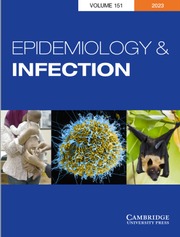Article contents
The immunogenicity of heat-inactivated vaccinia virus in rabbits*
Published online by Cambridge University Press: 15 May 2009
Summary
Rabbits were immunized by multiple intradermal injections followed by six intravenous doses of vaccinia virus inactivated by heating to 65° C. Particular attention was paid to confirming that the virus used was fully inactivated and incapable of reactivation. The immunized rabbits developed neutralizing and other antibodies to a titre comparable with those developed in response to live virus, but multiple intravenous injections were required to elicit a maximum titre. A qualitatively different response was seen only in immunodiffusion tests in agar gel where two or three fewer lines developed with antisera to heated virus than with those to live virus. The rabbits were subsequently challenged intradermally either with vaccinia and cowpox or with rabbitpox. They showed some immunity to vaccinia and cowpox, compared with normal controls, but less than that elicited by live virus. Their resistance to lethal doses of rabbitpox was life-saving though some rabbits did develop lesions. Later rechallenge of the rabbits showed that they had not developed further immunity, in distinction from the normal controls. The implications of these findings are discussed.
I wish to thank the National Fund for Research into Poliomyelitis and Other Crippling Diseases for their generous support in providing a Research Fellowship during which this work was done. I wish to thank also Professor A. W. Downie F.R.S. and the Staff of the Department of Bacteriology, University of Liverpool, for their encouragement and assistance respectively.
- Type
- Research Article
- Information
- Copyright
- Copyright © Cambridge University Press 1968
References
REFERENCES
- 14
- Cited by


